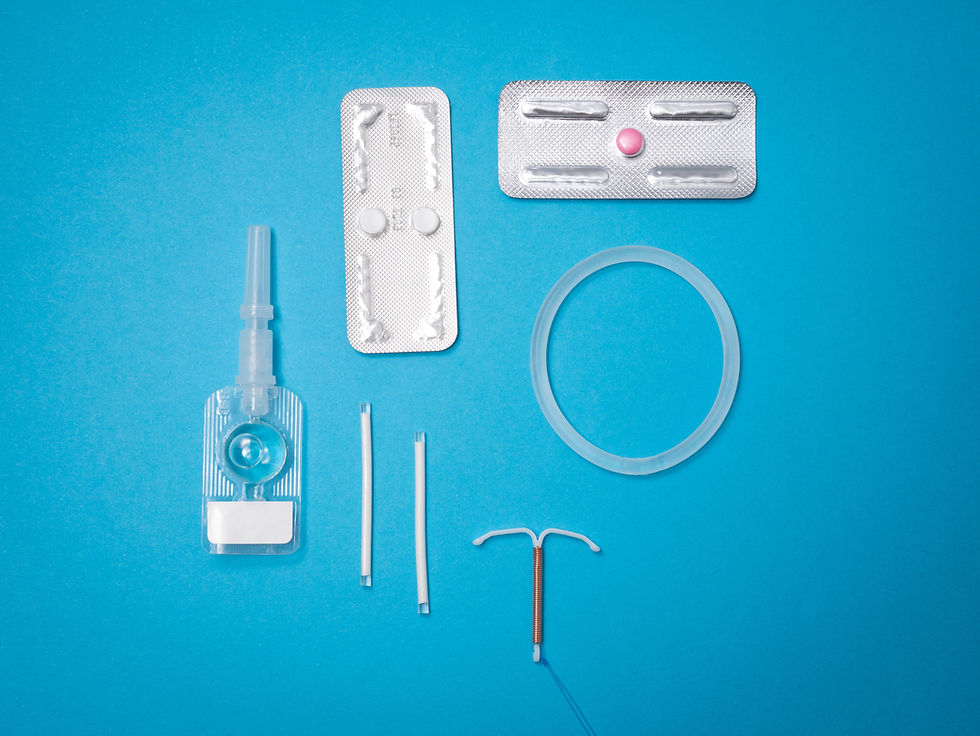Coming Off Contraception: Your Guide to Hormones, Nutrients, Thyroid & Whole-Body Wellness
- Nourish by Nudrat

- Sep 10, 2025
- 4 min read
Updated: Sep 16, 2025

Transitioning off hormonal contraception is a major milestone in any woman’s health journey. Whether you’ve used the pill, coil, patch, or another form, your body needs time, nourishment, and self-compassion to restore natural rhythms so that you can feel good in yourself again.
Recap of Female Hormones
Oestrogen and progesterone are the main female sex hormones. Oestrogen helps develop and regulate the menstrual cycle, supports bone and heart health, mood, and many aspects of fertility. Progesterone prepares the body for possible pregnancy after ovulation, balances oestrogen’s effects, and helps regulate the menstrual cycle. A small amount of testosterone is also produced in women, supporting libido, energy, and muscle strength.
What Happens When You Stop Contraception?
Hormonal birth control works by overriding your own cycle, suppressing natural hormone production. When you stop, your ovaries and brain begin communicating again, restarting natural cycles of oestrogen and progesterone. For some, regular periods return quickly, for others, cycles may be irregular, heavier or lighter, and accompanied by new symptoms as your body adjusts. In some cases, it can take several months for your cycle to re-regulate and if you've been on birth control for many years it can also take some time adjusting.
Typical transitional symptoms experienced include:
Irregular or heavy periods for a few months
PMS, headaches, mood swings or skin changes
Temporary weight shifts, changes in sleep or appetite
Tip: Track your cycle and symptoms in a journal or app to spot patterns and support your body’s unique timeline. A couple of apps that I've come across are Flo, and Natural Cycles, or you could even just use your calendar.
Nutrient Depletion: Rebuilding Your Stores
Long-term use of hormonal contraception can lower levels of key nutrients through changes in metabolism or absorption. Synthetic hormones can speed up how quickly nutrients are broken down, meaning your body uses them up faster than usual or the demand can be higher because there could be a greater demand for detoxification. In some cases, they can interfere with the way the gut absorbs nutrients.
Furthermore, returning to your natural cycle could increase your nutrient needs as hormone production ramps up.
Nutrients most affected or depleted are the following - Folate (B9), B vitamins (B2, B6, B12), Magnesium, Zinc, Selenium as well as Vitamins C and E.
Therefore, focus on the following foods -
Leafy greens, pulses, nuts and seeds
Eggs, fish, quality meats
Citrus, berries, colourful vegetables
Consider a good multivitamin for at least 3 months post-contraception
Thyroid Health: Often Overlooked
Oral contraceptives can impact thyroid function, especially if you already have a thyroid condition or family history. Pills can change thyroid hormone binding, metabolic rate, and may increase risk for hypothyroidism over time. Furthermore, the nutrient depletions might also impact the thyroid. Symptoms typically experienced are -
New or persistent fatigue
Weight and mood changes
Constipation, dry skin, sensitive to cold
Irregular or heavy periods
Tip: If you notice thyroid-related symptoms, discuss blood tests and medication review with your healthcare provider as your medication needs may change. Often, unless you're already being monitored for thyroid conditions you won't typically be offered a full thyroid blood panel and if you would like to understand your status, I can help arrange a more comprehensive blood test.
Gut Health & The Microbiome
Hormonal contraception can alter gut bacteria, research links it to reduced microbial diversity and occasional gut symptoms (bloating, IBS-like complaints, or cyclical changes). Remember your hormones, oestrogen and progesterone can support gut health.
Nourish your gut by:
Eating fermented foods (live yoghurt, kefir, kimchi, sauerkraut)
Adding fibre-rich plants daily
Reducing processed foods and excess sugar
You can find more resources on my website to support your gut.
Managing Inflammation & Supporting Your Liver
The transition off the pill can cause short-term inflammation as your body recalibrates and natural hormone production resumes. This may show up as menstrual pain, joint aches, acne, or bloating.
To calm inflammation, focus on:
Omega-3-rich foods (salmon, sardines, chia, flaxseed, walnuts)
Colourful vegetables, berries, turmeric, ginger
Minimising processed foods and refined sugars
Your liver helps process hormones, medications, and toxins. Therefore, supporting liver health is key!
Best foods for your liver:
Cruciferous vegetables (broccoli, cabbage, kale, rocket, cauliflower)
Garlic, onions, leafy greens, beetroot
Generous hydration (water, herbal tea)
You might need to also review the toxin burden on your body, so look at plastics, heavy metals, even alcohol and other meds.
The Takeaway
Coming off contraception offers the chance to reconnect with your body, restore nutrient balance, and support natural hormone cycles. Eat well, prioritise rest, and consider gentle detox and gut-friendly habits. Track symptoms and be patient, wellbeing after birth control takes time and individualised care.
If your cycles remain irregular, symptoms worsen, or you’re planning pregnancy, discuss hormone and thyroid testing with your healthcare provider, or why not book in a call with me. We can organise a comprehensive blood panel, test your hormone levels or maybe assess your vaginal microbiome. It's time for you to understand your body again. Book in for your free 30-mins chat and let's see how I could support you. We could explore a detailed blood panel to understand your health status.
Book here.
References







Comments